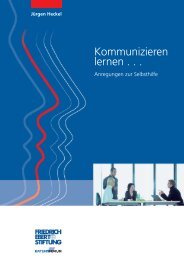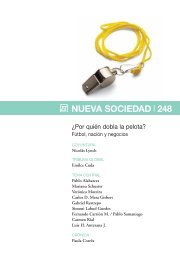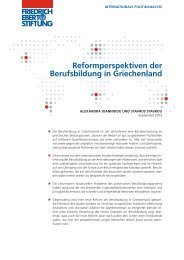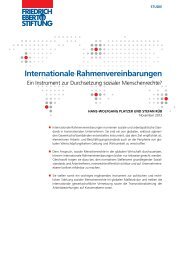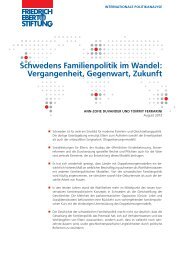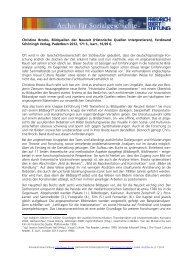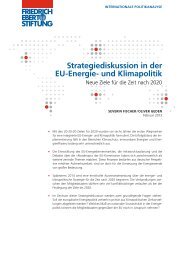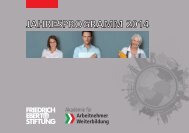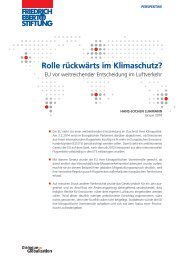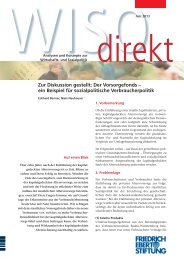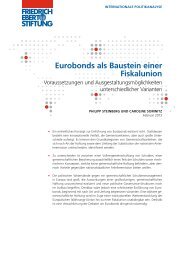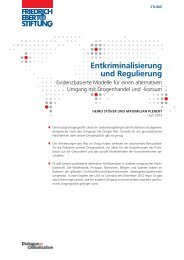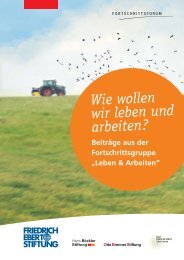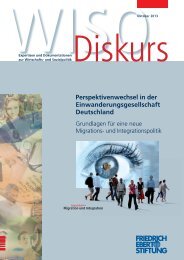Women - men - gender. - Bibliothek der Friedrich-Ebert-Stiftung
Women - men - gender. - Bibliothek der Friedrich-Ebert-Stiftung
Women - men - gender. - Bibliothek der Friedrich-Ebert-Stiftung
Create successful ePaper yourself
Turn your PDF publications into a flip-book with our unique Google optimized e-Paper software.
58<br />
STRUCTURING GLOBALIZATION SOCIALLY<br />
Tanzania<br />
The thorny path of the barefoot wo<strong>men</strong> lawyers:<br />
raising awareness on wo<strong>men</strong>’s rights in Tanzania<br />
Although the Tanzanian Govern<strong>men</strong>t offi cially<br />
supports equal rights for wo<strong>men</strong> and <strong>men</strong>, yet religious<br />
and customary traditions are obstacles in<br />
the way to advancing wo<strong>men</strong>’s rights. Especially in<br />
rural areas, wo<strong>men</strong>’s access to education is very<br />
poor as compared to <strong>men</strong>. As a result, it is more<br />
diffi cult for them to oppose miserable working<br />
conditions or the daily oppression they are subjected<br />
to. Till today, poverty in Tanzania is predominantly<br />
a wo<strong>men</strong>’s issue. In rural areas, where<br />
customary law is often practised to the detri<strong>men</strong>t<br />
of wo<strong>men</strong>, they are heavily discriminated against<br />
especially with regard to right to property and right<br />
to own land. The Deputy UN Secretary-General,<br />
Asha-Rose Migiro, a former minister in Tanzania,<br />
therefore, urges, “In or<strong>der</strong> to achieve equal rights<br />
we must support wo<strong>men</strong> in rural areas in particular.”<br />
For the past ten years, the FES has dedicated itself<br />
to this work. It supports the work of the so-called<br />
barefoot wo<strong>men</strong> lawyers (Paralegal Units, PLUs),<br />
because one reason for the continuing discrimination<br />
against wo<strong>men</strong> and for the oppression of<br />
wo<strong>men</strong> is their ignorance about their legal rights.<br />
Making information available in the concerned<br />
local languages, raising awareness about the rights<br />
and duties of <strong>men</strong> and wo<strong>men</strong> are the fi rst steps on<br />
the path to an equitable and just social or<strong>der</strong>.<br />
<strong>Wo<strong>men</strong></strong> working free of charge, offering legal consultancy<br />
are trained in family law, property law<br />
and political rights. They advise the wo<strong>men</strong> individually<br />
in their villages. They support those<br />
who are too poor to defray the legal expenses even<br />
in case of civil disputes before the court.<br />
The manual on wo<strong>men</strong>’s rights to land, the<br />
“ Kiongozi cha Sheria”, the fi fth edition of which<br />
was brought out by the FES in 2008, forms the basis<br />
for the legal training of the barefoot lawyers. Some<br />
of the subjects covered are Tanzanian land and<br />
property rights, child rights, marriage laws or the<br />
divorce law. This information on the new land laws<br />
FRIEDRICH-EBERT-STIFTUNG



